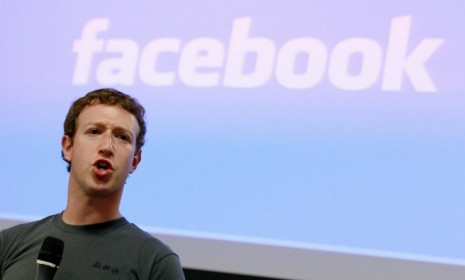Time for Uncle Sam to nationalize Facebook?
Yes, argues Philip Howard at Slate: Only the feds can save Facebook from itself

A free daily email with the biggest news stories of the day – and the best features from TheWeek.com
You are now subscribed
Your newsletter sign-up was successful
Facebook is struggling as a public company, with its stock hitting an all-time low last week and almost half of Americans predicting that the social networking giant will eventually fade away. Still, Facebook remains a social networking "monopoly" as well as "a public good and an important social resource," says University of Washington professor Philip N. Howard in Slate, and "if neither users nor investors can be confident in the company, it's time we start discussing an idea that might seem crazy: Nationalizing Facebook." Only the U.S. government can "fix the company's woeful privacy practices, allow the social network to fulfill its true potential for providing social good, and force it to put its valuable data to work on significant social problems." Is Howard's "thought experiment" just plain crazy, or is nationalization worth considering?
What a terrible idea: Howard's suggestion is "really, really, really awful," says Ed Krayewski at Reason. The government is the last entity you want to entrust with private data, given its frequent security breaches and self-serving misuse of personal information. Also, Facebook isn't a monopoly, or a "public good." It's a publicly traded company, and if it fails, that creative destruction will simply spur the internet to innovate and thrive. Once the government steps in, Facebook "becomes, by definition, too big to fail."
"Nationalize Facebook? Really?"
The Week
Escape your echo chamber. Get the facts behind the news, plus analysis from multiple perspectives.

Sign up for The Week's Free Newsletters
From our morning news briefing to a weekly Good News Newsletter, get the best of The Week delivered directly to your inbox.
From our morning news briefing to a weekly Good News Newsletter, get the best of The Week delivered directly to your inbox.
Hold on. Nationalizing Facebook has some merit: Howard's idea "has been met with a lot of strong negative criticism," and even he acknowledges it's a "nonstarter," but "the concept is fascinating nonetheless," says Amanda Le at the Independent Voter Network. Facebook is bigger and more enduring than its social media ancestors, and 900 million of us now have a stake in its survival. The idea of the government briefly taking a controlling share to restore public trust is admittedly "a little off-putting" at first, but if it means saving Facebook, nationalization "ultimately isn't such a crazy idea."
"Should we nationalize Facebook?"
It's a bad idea — but at least it's creative: "I have to take my hat off to Philip Howard for offering, as far as I know, a knock no one has ever articulated before" about the frequently criticized social network, says Jeff Bercovici at Forbes: "That it's not operated by the federal government." Still, despite the novelty, nationalizing Facebook is a really "stupid idea." Even Howard's least terrible point, that public health officials could use Facebook to monitor and fight disease, could be accomplished through public pressure, not public ownership.
"Stupid idea of the day: Let's nationalize Facebook!"
A free daily email with the biggest news stories of the day – and the best features from TheWeek.com
-
 Corruption: The spy sheikh and the president
Corruption: The spy sheikh and the presidentFeature Trump is at the center of another scandal
-
 Putin’s shadow war
Putin’s shadow warFeature The Kremlin is waging a campaign of sabotage and subversion against Ukraine’s allies in the West
-
 Media: Why did Bezos gut ‘The Washington Post’?
Media: Why did Bezos gut ‘The Washington Post’?Feature Possibilities include to curry favor with Trump or to try to end financial losses